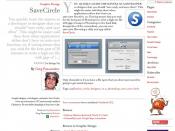Plagiarism is the act of using or passing off the ideas or writings of another as one's own. There are many different types of plagiarism, not just one. To plagiarize one's own ideas is dishonest and has many consequences that come with it. Although many people say they did not plagiarize, it's not hard to realize when someone has. Other than plagiarizing one's work, there are other ways to write an essay. Plagiarism isn't something that is taken lightly, and is often considering lying and/or cheating. "Plagiarism is the academic and literary equivalent of robbery, taking somebody else's property. If you copy somebody's test answers, take an essay from a magazine and pass it off as your own, lift a well-phrased sentence or two and include them without crediting the author or using quotation marks, or even pass off somebody's good ideas as examples of your own genius, you are guilty of intellectual thievery.
If you are caught you should expect punishment or contempt or both." Quote from Robert M. Gorrell and Charlton Laid, Modern English Handbook, 6th edition (Englewood Cliffs, NJ: Prentice-Hall, 1976), p.71.
Plagiarizing one's work is not simply just the act of taking a paragraph or a sentence that someone else has created. There are many different types and examples of plagiarism. One example is word for word plagiarism. This example includes material taken directly from a book, essay, article, speech, or any other type of writing. The second example is a footnote without quotation marks. Although you do need footnotes throughout your essay, you also need quotation marks for them to be acceptable. To have only a footnote doesn't help the reader understand what part of your essay is taken from another source. Paraphrasing is another common mistake, it too is plagiarism.



A good essay.
A really good essay for this site. Anyways it was well writen and i did not see any typos or spelling error but i am no proof reader. Good work.
On a side note Cheat house does not have formating so the tabs will turn into "<Tab/>" You should remove them on your next essay.
1 out of 2 people found this comment useful.